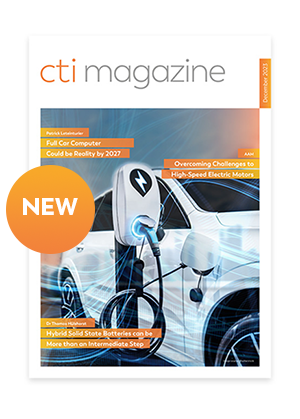Electric mobility is coming sooner than anticipated
Because of the decisions – and the discussion – in politics and business, electric mobility is coming sooner than we anticipated. This is the opinion of Jürgen Geise, CEO of Diehl Metall Schmiedetechnik. At the CTI Symposium 2016 in Berlin, he was available for a video interview.
In the recent past, there was the impression that the industry was still resisting, but now it feels as if the suppliers have come on board too. So has the industry really changed that much? Or are people just paying lip service here?
I think the industry has changed that much. External pressures are growing, something has to be done, and now we in the industry have to catch up and get ourselves ready for electric mobility.
So if the forecasts really do come true, a great deal would change for you as a supplier. Do you see events like the one here as a basis for decision-making, or are they just strategic padding?
I wouldn’t call it strategic padding. It’s definitely a basis for strategic development, because we’ve seen lots of figures that show us how in the next decade, our industry will definitely still be a growth market. But after that we’ll probably see the first negative tendencies, so obviously we need to ask ourselves today: what will the supplier industry be doing in ten years’ time?
How do you plan to respond in real terms? It’s definitely been recognized here that suppliers will have to adapt to their OEMs’ requirements too. Now they too are talking about a very short-term switch to electric mobility. What does that mean in real terms for you?
I don’t really see big problems with the short-term switch because hybrids will still be in the mix, and hybrids will still need a transmission. It’s only when battery-only electric mobility arrives. Then obviously we’ll have to look at that, together with the OEMs, and one day there might still be one or two gears to shift in electric mobility, or there might not. And these are the reasons why CTI will still be very important for us in years to come. There’s a great deal of research in electric mobility right now, but which standard will eventually prevail? And I think we’ll find the information here.
The event keeps on growing, and now the exhibition area, Transmission Expo, has got bigger too. You’ve always had the best spot here in the exhibition with your booth, what do you think of the big number of participants this year, and how interested are they in your information here on the booth?
It’s been a bit quieter on the booth than last year, which is surprising, but I think one reason is that things are a bit more divided up. It’s not one big space any more, there are other spaces too, and I think that reduces footfall a bit. We’re right next to the coffee bar, so obviously we can pull people in from there as well.
What’s your trend forecast for the coming years? The CTI Symposium will keep developing, but above all the market will keep developing. What’s coming over the horizon for your company, and for the market in general?
Changes, big changes, along the lines of: We’re going to have to adapt, otherwise our products will start to falter on the market in ten years’ time. Then slowly decline from there on. So we need to look around and ask ourselves, what other products can we supply to the automobile industry?
Is that a downbeat look at the future, or do you see new business opportunities arising too?
I definitely see new business opportunities too. If you feel sad about the future, it’s better to quit this business. No, the key here is to work out how we can keep on leveraging our core capabilities and strengths in future too.
